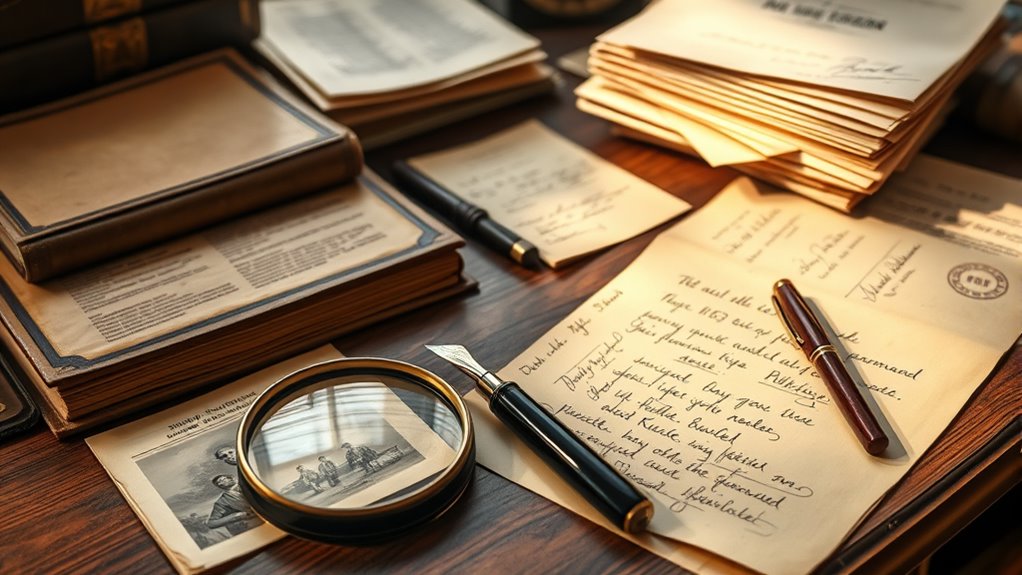When archiving family documents, it’s essential to verify they meet local legal requirements for validity and enforceability. Protect your documents from disputes by proper storage, using secure systems, and keeping detailed records of any updates or transfers. Use strong passwords and encryption for digital files, and follow privacy laws for sensitive information. Understanding regional laws around notarization and witness requirements helps prevent future legal issues. Continue exploring to discover key steps for compliant, secure document management.
Key Takeaways
- Ensure estate planning documents comply with local laws regarding storage, witnesses, and notarization for validity.
- Use secure, encrypted digital storage with strong passwords and regular backups to protect sensitive family information.
- Maintain detailed records of document transfers, updates, and access to establish an audit trail and legal compliance.
- Obtain proper authorization and adhere to privacy laws before sharing or transferring family documents.
- Stay informed about evolving legal regulations to ensure ongoing compliance and safeguard document enforceability.

Archiving family documents requires careful attention to legal considerations to guarantee their proper handling and long-term preservation. When managing important records like wills, deeds, or estate planning documents, you need to make sure they’re legally valid and protected from potential disputes. Estate planning documents are particularly sensitive because they dictate how assets are distributed after your loved ones pass away. Properly archiving these ensures they remain accessible to authorized individuals and are legally enforceable when needed. You should also be aware of local laws concerning the storage and handling of such documents, including requirements for witnesses or notarization. Failing to comply with these can jeopardize the validity of the documents, leading to complications down the line.
Properly archiving estate documents ensures legal validity and long-term accessibility for authorized individuals.
Digital security plays a vital role in safeguarding these records. As more families shift to electronic storage, you must prioritize protecting digital copies from unauthorized access, hacking, or accidental loss. Use strong, unique passwords for digital archives and consider encryption to add an extra layer of security. Regularly updating security software and backing up files in secure, off-site locations helps prevent data loss due to hardware failures or cyber threats. You should also be mindful of who has access to digital files and establish clear permissions, especially if the documents include sensitive information like financial details or personal identities. Employing secure cloud storage solutions with robust security protocols can help you maintain both accessibility and confidentiality.
Furthermore, understanding self watering plant pots can serve as a metaphor for maintaining consistent security practices in your digital archiving efforts, ensuring that your data remains healthy and well-nourished over time.
Legal considerations extend beyond just storage. When sharing or transferring family documents, you must adhere to privacy laws and consent requirements. For example, if you’re handling documents that contain the personal data of others, you need to make sure you have proper authorization to share or distribute them. Additionally, it’s wise to keep detailed records of any transfers, updates, or modifications to these documents, as this can be valuable in legal disputes or estate resolution processes. When dealing with digital files, maintaining an audit trail can serve as proof of proper handling and compliance with legal standards.
Ultimately, being proactive about estate planning and digital security helps you protect your family’s legacy. By understanding the legal landscape surrounding document archiving, you can avoid costly errors and make sure that your loved ones’ wishes are honored and enforceable. Taking these precautions not only secures sensitive information but also provides peace of mind, knowing that your family’s important documents are handled legally and safely for generations to come.
Frequently Asked Questions
Can I Archive Family Documents Without Legal Ownership Rights?
You can archive family documents without legal ownership rights, but you should be cautious about family document preservation and legal ownership questions. If you don’t own the documents, it’s best to obtain permission from the owner before archiving or sharing them. This ensures you’re respecting privacy and legal boundaries. Always clarify ownership and seek consent to avoid potential legal issues, especially if the documents hold significant personal or legal value.
Are There Specific Storage Requirements for Legally Sensitive Documents?
Imagine a secure vault protecting your most valuable keepsakes. For legally sensitive documents, you should use digital storage solutions that offer robust encryption and access controls. Guarantee your storage methods comply with privacy laws and data protection regulations. Keep backups in separate locations. This way, your documents stay safe from theft, damage, or unauthorized access, giving you peace of mind and maintaining their legal integrity.
How Long Should I Retain Different Types of Family Records?
You should retain family records based on their importance and legal relevance. For example, keep birth, marriage, and death certificates permanently for document preservation. Tax and financial records typically need to be kept for at least seven years, while medical records vary by privacy regulations. Regularly review and organize your documents to make certain of compliance with privacy regulations, and safely dispose of those that no longer serve a purpose.
Do I Need to Notify Heirs Before Archiving Family Documents?
You’re asking if you need to notify heirs before archiving family documents. It’s wise to keep everyone in the loop, as heir notification and consent requirements can vary by jurisdiction. While you may not always need formal approval, respecting your heirs’ rights helps avoid future disputes. Think of it as crossing your T’s and dotting your I’s—clear communication makes the process smoother and safeguards your intentions.
What Legal Risks Are Involved in Digitizing Family Documents?
When digitizing family documents, you face legal risks like infringing on intellectual property rights if you don’t have permission to reproduce copyrighted materials. Privacy concerns also arise if sensitive personal information is stored without proper safeguards. You need to make certain you’re compliant with laws protecting privacy, and avoid using or sharing copyrighted content without authorization to prevent potential legal disputes.
Conclusion
As you carefully archive family documents, remember that legal considerations often align with your intentions—like how a forgotten letter unexpectedly reveals a vital detail. By staying informed and organized, you not only preserve your family’s history but also protect its legacy. Sometimes, the smallest detail can make a big difference, reminding you that attention to legal nuances today guarantees peace of mind tomorrow. In this way, your diligence becomes a quiet safeguard for generations to come.









